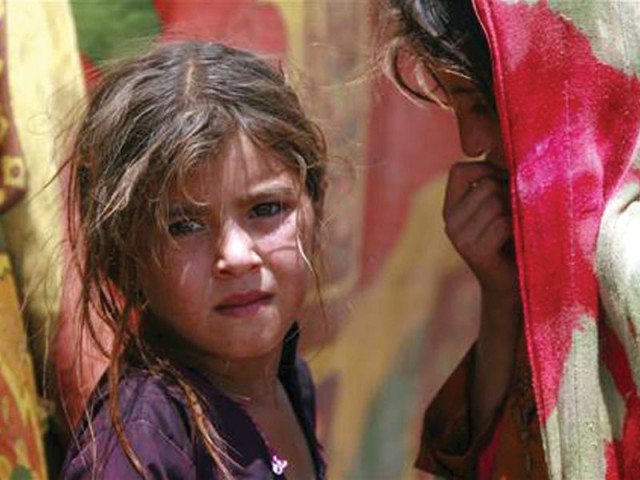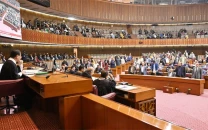Budget priorities: Experts slam dismal child-related allocations
Speakers at report launch urge govt to raise funding for health, education.

In Pakistan, limited budgetary allocations for the basic needs of children have deprived many from their right to education and healthcare, reveals a report.
Launched on Wednesday, the Child Rights Movement (CRM) report — titled “National, Federal and Provincial Budget Analysis from a Child Rights Perspective 2012-13” — says that in 2012-2013, the sum of all allocations for child-focused health, education and social welfare is 0.75 per cent of the Gross National Product (GNP), which indicates that low priority was given to children and related schemes, programmes and projects. According to the report, Pakistan has allocated 0.66 per cent of GNP for child-focused education, 0.11 per cent on child-focused healthcare, and 0.02 per cent on child-focused social welfare.
On the state of education, the report reveals that about 7.3 million children in Pakistan are out of school. Meanwhile, the situation on basic healthcare for children paints an equally dismal picture. As of 2010, an estimated 87 out of every 1,000 children died before age-five, stunting rate among children has exceed 40 per cent, and around 31 per cent of children in this age group are moderately or severely underweight.
Compared to 2009, there was an increase in the number of reported suicides and attempts by children. In 2009, there were 185 reported suicides and 42 attempts, while in 2010, there were 187 reported suicides and 80 attempts.
Meanwhile by the end of 2011, more than 1,400 children were reportedly being held in various detention centres across Pakistan.
“Limited budget allocations for child development reflect a lack of seriousness on the part of the government and its efforts to meet constitutional and international commitments to effectively protect and promote child rights in the country,” states the report.
Following the 7th NFC award and the passage of the 18th Amendment, the provinces were allocated more resources and made more autonomous. However, they have not made any significant increases in child-focused budgetary allocations, the report says.
Meanwhile, participants in the launch ceremony demanded that the government increase the budgetary allocations for children in line with the concluding observations and recommendations of the UN Committee on the Rights of the Child made during considering 3rd and 4th State Party Report of Pakistan.
Samina Sardar, a child rights activist, said the low budget allocation for children shows that the government does not want to see a prosper and healthy Pakistan in the next 30 years. Farhan Abid from Idara-e-Taleem-o-Aagahi (ITA) called for expedition of the implementation of Article 25-A.
Mohammad Bashirul Haq, a public health expert, said poverty is one of the major reasons behind poor healthcare, low literacy and the child labour.
“How can people below the poverty line think of sending their children to school when they are unable to even provide them with three meals a day?” he asked.
MNA Riaz Fatyana, who is chairman of the NA Human Rights Committee, said, “It is very unfortunate that government would not be able to fulfil its international commitments to achieve the Millennium Development Goals by 2015, just because child education is not its top priority.”
Published in The Express Tribune, December 20th, 2012.



















COMMENTS
Comments are moderated and generally will be posted if they are on-topic and not abusive.
For more information, please see our Comments FAQ